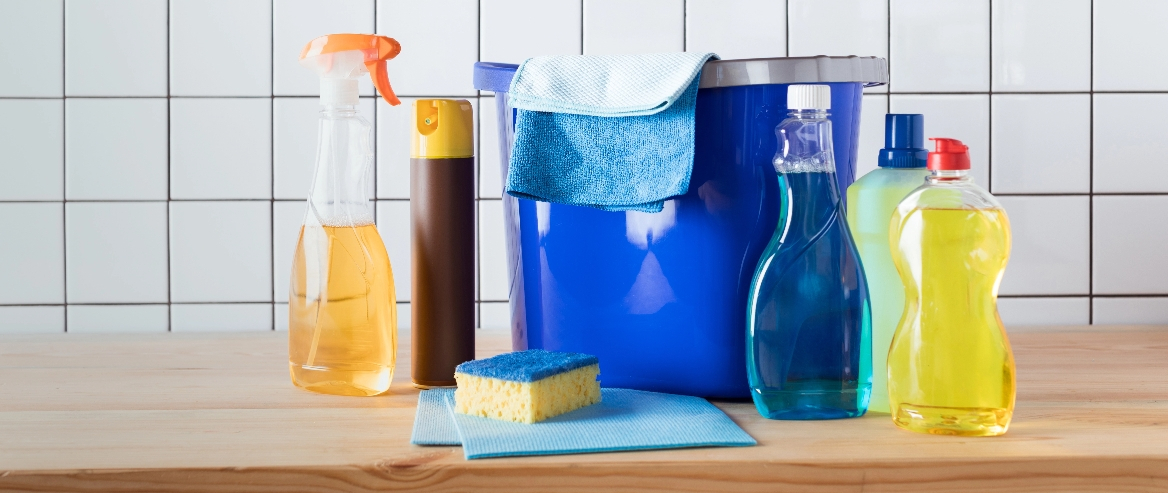4 Ways You’re Being Greenwashed by Cleaning Products
Published on Oct 3, 2022

Everyone wants to feel like they’re doing their part to help the planet … and big companies know it.
It’s not easy being green, but it’s even harder when you’re being lied to.
This is how you can cut through the jargon.
What is "Greenwashing" and why is it a problem?
With increasing consumer demand for more sustainable, eco-friendly, and ethical products, greenwashing is when a company overplays how good its product is for the environment.
While many businesses are working hard to turn the tide and genuinely improve their environmental imprint, some have employed marketing tactics that make you think you’re purchasing green, when very little has changed about the product at all.
This practice erodes consumer confidence in sustainability and muddies the market, making it difficult for people to make informed choices and harming the environment in the process.
4 Types of Greenwashing
Tackling the cleaning product aisle or deciphering label information and polished, misleading television commercials can be confusing. Greenwashing can even be something as subtle as suggestive imagery on a label.
Confused? We can help.

1. Vagueness
At the Sydney Morning Herald Sustainability Summit on September 20, 2022, Australian Competition and Consumer Commission Deputy Chair Delia Rickard advised the commission was actively targeting businesses making false claims about their products.
“Broad terms like ‘environmentally friendly’, ‘green’, or ‘sustainable’ have limited value and may mislead consumers, as they rarely provide enough information about what that exactly means in terms of the product or service consumers are considering purchasing,” she said.
If a product claims on the label that it is sustainable or biodegradable, it needs to explain how this is being achieved.
Be aware of absolute terms such as ‘chemical free’ – many, many things, including water and plants, are made up of chemicals.
You should also be cautious of words such as ‘all natural’. There is a range of substances (including arsenic and mercury, among others) that are technically all natural but obviously, not good for you.

2. Insignificance
If you check a label and an environmental claim has been made, it may look impressive but is it relevant?
Any labels claiming that their product contains no CFCs (which are a major factor in the weakening of the ozone layer), for example, is greenwashing. Australia banned the importation and manufacture of CFCs from 31 December 1995, for all but essential uses.
A label that says its product is ‘green’ should explain why – it may simply be alluding to the colour of the label or the product itself.

3. A lack of Proof
Any claim made on the label of a cleaning product should be backed up with proof, and easily found on the company’s website or via an independent and reputable third-party organisation.
The supporting information should be in a format that is easy for a layperson to understand as well.

4. The Compromise
This is one of the more prevalent complaints made, making up 57% of all false claims. Known as a hidden trade-off, this is when a product claims to be green based on one criterion rather than the overall negative environmental effect of the product.
It’s a ‘look at the birdie’ tactic – distracting consumers with something else so that they don’t notice the big picture.
5 Ways to Fight Greenwashing
-
Report claims you believe to be false to the ACCC.
-
Utilise products such as white vinegar and baking soda for chores around the home.
-
Do your research. Any claims made on products should have evidence readily available on the company website or through a reputable third party.
-
Check labels for certifications, such as including Fairtrade, B corp, and Rainforest Alliance Certified.
-
Read the fine print on the label.
Companies That Commonly Use Greenwashing
Greenwashing isn’t just gaining prevalence in the cleaning product industry; many of the other products we purchase are susceptible to this marketing spin as well.
Here are a couple of other products to be on the lookout for.
Greenwashing in Fashion

Similar to cleaning products, greenwashing in the fashion industry is when a company makes misleading claims that their products are more environmentally friendly than they really are.
This article from sustainable fashion organisation Good on You highlights how fashion companies attempt to greenwash and what to be cautious of.
Financial Companies and Greenwashing

The Australian Securities and Investments Commission considers financial greenwashing to be the practice of misrepresenting the extent to which a financial product or investment strategy is environmentally friendly, sustainable, or ethical.
This relates to superannuation and other investments and is important to many of us – in a recent consumer research report, the Responsible Investment Association Australasia (RIAA) revealed that 86 percent of Australians expect their investments to be invested responsibly and ethically.
How can Electrodry help with my cleaning routine?
If the thought of taking on the cleaning product aisle sounds overwhelming, or if your home needs freshening up, you should consider contacting Electrodry.
We offer a range of professional home services designed to make your home the healthiest it’s been in years while enhancing its appearance.
Some of these services include tile and grout cleaning, timber floor restoration, mould cleaning, and of course, our signature carpet dry cleaning service.
Give our team a call on 13 27 13 or make a booking online.